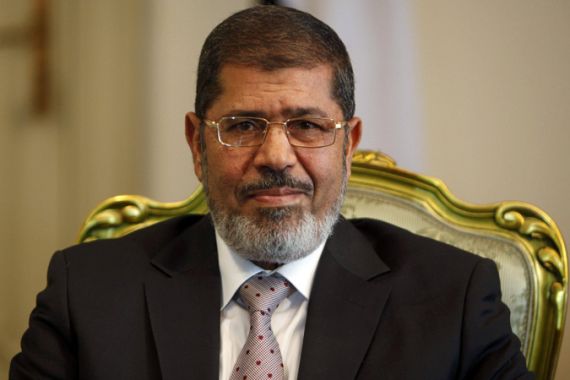Deposed Egyptian president to be investigated
Prosecutors launch criminal inquiry against Morsi after complaints of spying, inciting violence and economic collapse.

Egypt has announced a criminal investigation against deposed President Mohamed Morsi, with prosecutors saying they were examining complaints of spying, inciting violence and ruining the economy.
The public prosecutor’s office issued a statement on Saturday saying it had received complaints against Morsi, eight other named Islamist figures including top Brotherhood leader Mohamed Badie, and others it did not identify.
The prosecutors did not say who had made the complaints.
Egypt’s first freely elected leader has been held at an undisclosed location since the army removed him from power on July 3, but has not yet been charged with any crime.
In recent days, Washington has called for him to be freed and for the authorities to stop arresting leaders of the Muslim Brotherhood.
The complaints are a first step in the criminal process, allowing prosecutors to begin an investigation that can lead to charges.
Announcing the step was unusual: typically prosecutors wait until charges are filed before making public statements.
Badie and several other Brotherhood officials already face charges for inciting violence that were announced earlier this week, but most of them have not been arrested.
Egyptian law allows them to investigate complaints from police or any member of the public.
The Muslim Brotherhood called on Saturday for more mass demonstrations after a huge march broke up peacefully before dawn, ending a week in which at least 90 people were killed.
Senior Brotherhood figure Essam El-Erian, one of those who faces arrest, called on his Facebook page for more demonstrations on Monday.
“Egypt decides through the ballot box, through protests, mass marches and peaceful sit-ins,” he said.
The Brotherhood, which has maintained a vigil near a Cairo mosque since before the army removed Morsi, has said it will not leave the streets until he is restored to power.
The military says it deposed Morsi in a justified response to popular demand after millions of people demonstrated against him.
The Brotherhood says it was a coup that reversed democracy.
Turmoil in the most populous Arab state has concerned the West, as Egypt sits astride the Suez Canal and has a strategically important peace treaty with Israel.
The US has refused to say whether it considered the army takeover a “coup”, which under US law would require it to cut off aid including $1.3bn a year in military support.
Egypt’s economy has been struggling since a popular uprising toppled President Hosni Mubarak in 2011, and the turmoil since then has driven away investors, draining hard currency reserves and making it difficult to import food and fuel.
The army has appointed a judge as interim president and a liberal economist, Hazem el-Beblawi was named as prime minister, who is trying to cobble together a cabinet likely to be made up mainly of technocrats and liberals.